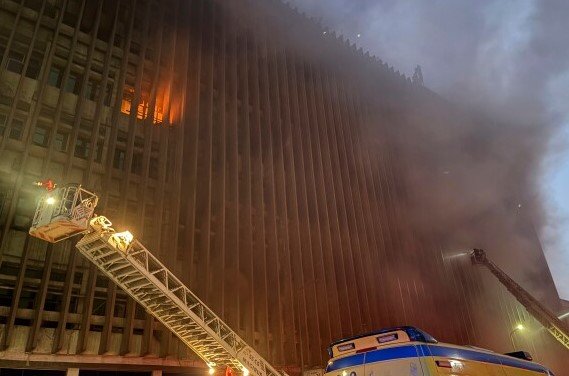Talaat Defends Emergency Handling, While Lawmakers Demand Accountability Over National Disruptions
A fatal fire at one of Egypt’s most important telecom hubs is sparking political fury, shaken public trust, and growing scrutiny from lawmakers — and on Tuesday, the country’s tech chief was forced to face the music.
Appearing before Parliament just a day after the blaze engulfed the Ramses Central telecom building in downtown Cairo, Minister of Communications and Information Technology Amr Talaat defended the government’s response amid searing questions and a visibly angry legislature.
Blame and Alarm in the Wake of the Flames
The July 8 fire killed four people, injured at least 14 more, and knocked out mobile and internet services for millions across the country — from banks and hospitals to online taxis and grocery apps.
Speaker Hanafy Gebaly summoned Talaat after hours of national disruptions ignited frustration on the floor of Parliament. Several MPs publicly demanded to know why Egypt’s communications backbone appeared so vulnerable — and why public services were left scrambling.
Talaat said the inferno started in a server room on the seventh floor. An alarm was triggered by smoke detectors, prompting staff to act quickly.
But it wasn’t enough.

A Hub Goes Dark
Employees tried to control the flames, but fire raced through cable ducts and quickly overwhelmed the building’s suppression system. Within minutes, plumes of thick smoke blanketed the Ramses district skyline.
“The fire suppression system in the building was overwhelmed by the intensity of the flames,” Talaat said, his tone firm but clearly strained.
He insisted the building was critical, but not irreplaceable.
Not the Only Hub in Town
Talaat emphasized that Egypt’s telecom infrastructure wasn’t built around a single point of failure. While Ramses Central is a major node, he said, contingency plans were immediately activated to reroute mobile and broadband traffic through alternative hubs.
That didn’t stop a national service collapse for several hours.
NetBlocks, the global internet monitoring watchdog, said that at the height of the outage, Egypt’s national internet connectivity plunged to just 62% of normal levels.
And it wasn’t just slow-loading webpages.
Disruptions Felt Everywhere
Banks stalled. Payment apps froze. Online delivery services were knocked offline. Government helplines were unreachable.
And for families trying to reach loved ones in Gaza or Sudan, where communications are already fragile, the blackout hit especially hard.
By late evening, most services had been restored. But frustration lingered.
-
Telecom Egypt customers reported being unable to make calls or complete online transactions for more than five hours.
-
Cairo International Airport saw internal delays as backend systems lagged due to disrupted mobile internet.
-
A handful of hospitals in Upper Egypt reported temporary difficulty transmitting patient data to centralized health records.
Parliament Wants More Than Assurances
While Talaat laid out his timeline and rerouting strategy to lawmakers, he was peppered with pointed follow-ups.
“Why wasn’t the building better equipped to contain such an obvious risk?” one MP shouted.
Another accused the ministry of “playing roulette with national security” by failing to update fire systems in a key digital control center.
Talaat didn’t directly answer whether anyone in his ministry would resign or be dismissed, but said a formal investigation is already underway.
Public Trust Takes a Hit
The Ramses fire has cracked open deeper fears about Egypt’s telecom resilience.
The central building, which dates back decades, handles a vast share of domestic voice and data traffic. Though upgrades have been ongoing, many say they’ve lagged behind the pace of urban digitization.
One telecom engineer, speaking anonymously due to the sensitivity of the matter, said: “The infrastructure is old. It needs a rethink, not a patch.”
Public sentiment seems to agree.
The Broader Risk Map
In a report published Tuesday evening, Cairo-based technology policy watchdog AccessNet warned that Egypt’s urban internet network is “dangerously centralized” and could be at risk from future accidents, sabotage, or even climate events.
The report included the following table assessing central hub fire preparedness across four major North African capitals:
| City | Primary Internet Hub | Fire Suppression Grade | Backup Redundancy Rating | Emergency Response Delay |
|---|---|---|---|---|
| Cairo | Ramses Central | C- | B+ | 20 minutes |
| Algiers | Palais Central des Réseaux | B | B | 12 minutes |
| Rabat | Maroc Télécom Hub A | B+ | A- | 9 minutes |
| Tunis | Tunisie Télécom Centre | B | B | 11 minutes |
Political Fallout Still Unfolding
For now, Prime Minister Mostafa Madbouly’s cabinet is staying quiet, letting Talaat absorb the heat.
But analysts believe the backlash could grow if further disruptions occur.
“People may forgive one fire,” said Amina Khalil, a digital governance expert at Cairo University. “But they won’t forgive a pattern of outages in 2025.”
A quick fix might not be enough.
Even as full connectivity returns, pressure is now on Egypt’s government to reimagine the architecture of its digital infrastructure — before the next cable conduit catches fire.
